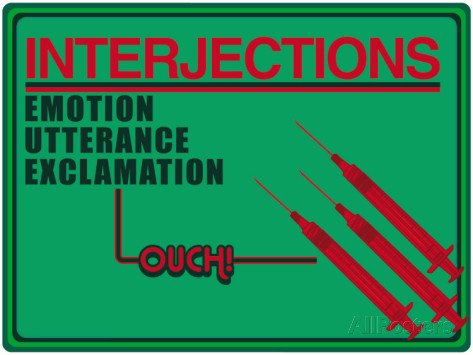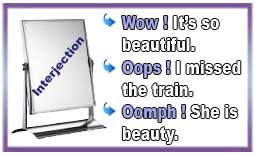Interjections
Interjection is a big name for a little word. Interjections are short exclamations like Oh!, Um or Ah! They have no real grammatical value but we use them quite often, usually more in speaking than in writing.
When interjections are inserted into a sentence, they have no grammatical connection to the sentence. An interjection is sometimes followed by an exclamation mark (!) when written.
Interjections like er and um are also known as “hesitation devices”. They are extremely common in English. People use them when they don’t know what to say, or to indicate that they are thinking about what to say. You should learn to recognize them when you hear them and realize that they have no real meaning.
Interjections are words used to express strong feeling or sudden emotion. They
are included in a sentence – usually at the start – to express a sentiment such
as surprise, disgust, joy, excitement or enthusiasm.
are included in a sentence – usually at the start – to express a sentiment such
as surprise, disgust, joy, excitement or enthusiasm.
Examples:
Hey! Get off that floor!
Oh, that is a surprise.
Good!
Now we can move on.
Now we can move on.
Jeepers, that was close.
Yes and No
Introductory expressions such as yes, no, indeed and well are also classed as interjections.
Examples:
Indeed, this is not the first time the stand has collapsed.
Yes, I do intend to cover the bet.
I’m sure I don’t know half the people who come to my house.
Indeed, for all I hear, I shouldn’t like to. (Oscar Wilde)
Well, it’s 1 a.m. Better go home and spend some quality time with the kids. (Homer Simpson)
Phew!Some interjections are sounds:
Examples:
Phew! I am not trying that again.
Humph! I knew that last week.
Mmmm, my compliments to the chef.
Ah! Don’t say you agree with me. When people agree with me, I always feel that I
must be wrong. (Oscar Wilde)
must be wrong. (Oscar Wilde)
Avail Your Free Trial Class Today and get a helping hand for your Assignments, Thesis, Projects and Homework !
mework







